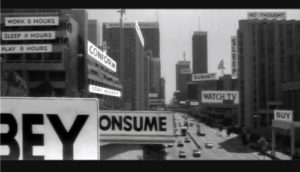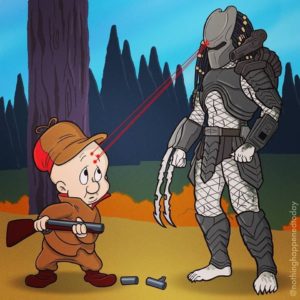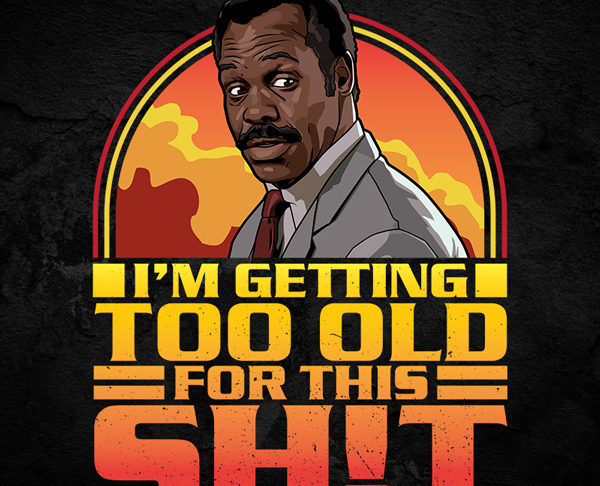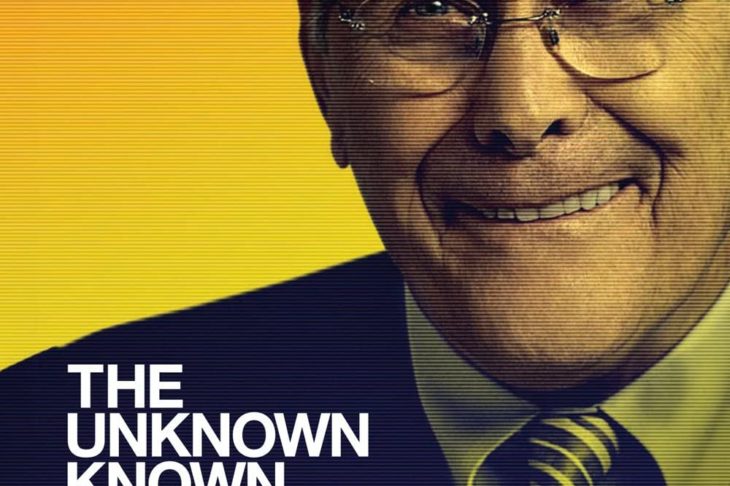They Live: Do not STAY ASLEEP
“A whole lot of people going crazy over some nutty dream they just had. The truth is, this kind of shit happens at the end of every century. It’s just people afraid to face the future.” — They Live
The 1980s provided movie watchers some memorable movies that have aged very well or even done better. One of the best science fiction movies from that era was Wes Craven’s They Live (1988) starring Roddy Piper and Keith David. Since its original release, the movie gained a cult classic status and has one of the best lines in any movie (that would later be used in the great video game Duke Nukem).
“I have come here to chew bubblegum and kick ass. And I’m all out of bubblegum.”
This movie may not be the traditional military movie that has been discussed in this forum, but for the U.S. military members it should look very familiar.
Based upon the short story “Eight O’Clock in the Morning” by Ray Nelson in which John Carpenter wrote the screenplay, the story follows an unnamed Drifter (played by Piper) who ends up in Los Angeles after losing his job and looking for a restart. Society seems to becoming unhinged while economic policies have destroyed the middle class causing significantly increased poverty and making it more difficult to survive. Following several negative attempts at securing a job, he finally gets a job on a construction site and meets Frank (Keith David).
Frank takes the Drifter back to a Shanty Town and meets Gilbert who warmly welcomes the Drifter to their community of beggars, homeless, and people forced out of society. Something though did not seem correct coming from the local church across the street from the camp. He investigates and finds that the choir music he had been hearing is recorded and Gilbert and his friends are discussing their unsuccessful attempt at jamming the local TV signal. The Drifter hides a box of very fashionable black sunglasses and mixes back into the crowd.
Later that evening, the Los Angeles Police raid the church and camp brutally beating everyone and burning down the camp and church. The Drifter walks the streets of Los Angeles confused and dazed, but hides his box of black sunglasses. He puts on these stylish glasses and is stunned at the world he sees. Lavishly colored billboards, magazines, and signs are replaced with white backgrounds and black text with one or two words.
OBEY
CONSUME
MARRY AND REPROUDCE
BUY
SUBMIT
STAY ASLEEP
DO NOT QUESTION AUTHORITY
THIS IS YOUR GOD
When he turns towards people standing next to him, he discovers that the people who are gingerly purchasing magazines and groceries are ugly aliens impersonating humans. The Drifter reacts with full shock and eventually starts fighting back against the system that wants him dead. He fights with a purpose that in the end he gives everything he has to bring about the truth of the world imperially occupied world he sees. In the end, he gives his life with the goal of changing the world people are blindly living within.
They Live may have been a movie blasting Reagonomics from the 1980s, but this film is a tremendous representation of irregular warfare. More importantly, the film demonstrates the far under appreciated “strategic terrorist or freedom fighter” that can make strategic impacts from their tactical actions. These individuals are the ones who are wild cards; seemingly irrational and perhaps illogical, these people will sacrifice everything including their life to make the impact they so desire.
The Drifter shoots and destroys the antenna that has been emitting a signal blinding the world to the enslavement of mankind to alien imperial economic goals. Holly, his love interest, tells him he can not win so there is no point in sacrificing his life.
“Fuck it,” he angrily says as he fires the pistol. As he dies, the signal disperses and he gives the middle finger to the screen.
The ultimate weapon for the strategic terrorist is his/her ability to sacrifice everything including their own life to reach their objectives. That is a variable that seems absolute, but mostly makes planning difficult to fully quantify possibilities to counter. In response to wild possibilities, plans to counter these individuals tend to be all encompassing and may seem overkill. More possibility makes the increased protections not necessarily effective at stopping these threats.
https://www.youtube.com/watch?v=mMNh38LQjXU
Sacrificing oneself for a cause. This message reminds the watcher that sometimes when actions are vital to driving political or military change, even ones own life is mandatory for sacrifice. For military members this may seem rather simple to understand, but perhaps we as members of the modern military are not used to military casualties especially in the quantities from pre-Vietnam War.
There is a great line from the movie Gettysburg where General Robert E. Lee says, “To be a good soldier, you just love the army. To be a good commander, you must be willing to order the death of the thing you love.”
An outstanding person knows that sacrifice comes in many different shapes and forms for various different reasons. A great person knows the impact of sacrifice, even a series of small events, have on the person paying the cost.
When we think of sacrifice and military operations, we tend to think in terms of military members losing their life or being seriously injured the rest of their life. Leaders at all levels understand the need to sacrifice for the larger goals, but most common sacrifices do not come at the cost of life. There is a relationship between the larger the impact verses the higher need for sacrifice.
In the military, we make small sacrifices for small reasons with those sacrifices increasing in severity to match the increasing importance of the request. There are those days that are longer than eight hours because some task has to be completed or perhaps a lost weekend when your battalion or squadron needs to deploy. Sometimes you miss out on Christmas or Thanksgiving because your unit is deployed in a contested area in the Pacific or you live having Taliban forces shell your position on a FOB in Anbar Province, Afghanistan in order to “stabilize” the local area. Maybe you sacrifice your innocence dropping bombs on enemy forces killing dozens or perhaps jump on a grenade to save those fellow soldiers around you.

This is what They Live reminds us: sacrifice is always present and in fact the ultimate price should be paid to make the most impactful effect.
Given technology and the risk averse political environment, military deaths are fewer than they used to be, but the smaller sacrifices are always below the radar and add up over time. Your job as a military member is to remember how the cost of additional duties or extended days take you away from your life, family, and passions. These cumulative sacrifices can severely impact the important things in your life and therefore may be the equivalent of jumping on grenade.
Yes there maybe times, like the Drifter demonstrated in They Live, one must make larger sacrifices or even the ultimate sacrifice. Relating back to the original list of black and white messages from the movie, we as people who sacrifice in our careers must NOT follow a single item on that list. Especially for those small sacrifices that added up over time… Your job is NOT your God. Do NOT consume. Do NOT stay asleep.
Those little sacrifices may need to be made, but they should not be done in such a way that “kills” the person or family that you have built. These are the conversations though that companies and military leadership do not want you to have with yourself and your family; how much are you willing to sacrifice to feed the military institution and beast. If one does not stop to reflect on their willingness to sacrifice to the military, then they are no better than people of Los Angeles in They Live.

Pred
For 19 years, Pred has sacrificed multiple weekends for the U.S. Air Force. More importantly he sacrificed his twenties and thirties in North Dakota.


